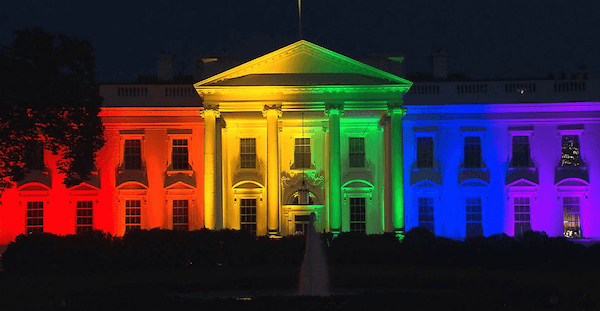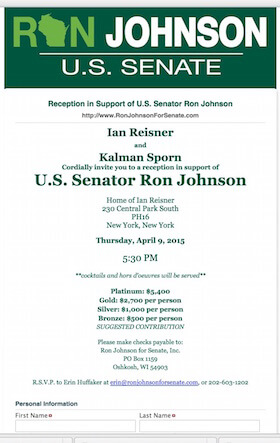President Barack Obama in a 2012 interview with ABC's Robin Roberts announcing his support for marriage equality. | PETE SOUZA/ THE WHITE HOUSE
President Barack Obama will issue his long-awaited executive order barring discrimination against LGBT employees by contractors doing business with the federal government on July 21, a White House official told Gay City News this afternoon.
Significantly, the president’s action will include no exemptions beyond what already exist in standing executive orders governing non-discrimination requirements imposed on federal contractors.
Obama’s order will amend Executive Order 11246, originally issued by President Lyndon Johnson in September 1965, which barred discrimination based on race, color, religion, sex, and national origin. Sexual orientation and gender identity will now be added to that list.
Ongoing controversy about the religious exemption included in the current version of the proposed federal Employment Non-Discrimination Act (ENDA) –– compounded by the recent Supreme Court ruling in the Hobby Lobby case that permitted closely-held corporations to claim a religious exemption from complying with contraception coverage requirements of the Affordable Care Act –– raised significant concerns about whether Obama would treat sexual orientation and gender identity differently in his order than other protected classes already are treated.
The decision to simply amend the 1965 Johnson order lays to rest that concern –– which was fueled by pressure the administration was getting from religious conservatives and some congressional Republicans to treat LGBT discrimination as an exceptional circumstance.
In a written statement from GetEQUAL, one of the LGBT groups that has repeatedly raised concerns about the exemption issue, Heather Cronk, the group’s director, said, “We're so proud today of the decision made by the Obama administration to resist the calls by a small number of right-wing conservatives to insert religious exemptions into civil rights protections.”
In 2002, the Johnson-era order was amended by President George W. Bush to allow religiously-affiliated contractors to favor members of their own faith in hiring decisions, and such organizations enjoy a well-established First Amendment “ministerial exemption” regarding their hiring of personnel directly related to carrying out their faith practice.
Bush’s amendment applies across the board to protections for all the classes covered by the Johnson order, and Obama will not expand or alter the language regarding religious exemptions.
Demands by LGBT advocates that the president move on an executive order have steadily escalated during his years in office as the prospects for enactment of ENDA have dimmed. ENDA was passed last year by the Senate but Republican Speaker John Boehner has said the House will not take up the measure in the current Congress. With the GOP widely expected to hold onto the House in the November elections –– and possibly gain control of the Senate, as well –– Obama may never have the opportunity to sign the legislation.
Though Obama’s action will not provide comprehensive employment protections in the private sector, it is estimated that the contractors covered in his order employ roughly 28 million workers, nearly 20 percent of the total American workforce.
The high court’s June Hobby Lobby decision, meanwhile, heightened anxieties about what the religious exemptions in ENDA could mean. Even LGBT advocates who had supported the language as approved by the Senate conceded it could be used by a religiously-affiliated hospital or university to fire or refuse a job to a gay or transgender janitor, nurse, or instructor. When the Supreme Court, for the first time, held that a corporation could assert religious freedom to exempt itself from a statutory requirement, the radical nature of the exceptions contemplated regarding LGBT nondiscrimination protections as compared to those governing race or sex became even more clear.
The escalating concerns, in turn, led to a stampede in which leading LGBT advocacy groups disavowed the current exemption language in ENDA. On July 9, in three separate statements, the National Gay and Lesbian Task Force, leading LGBT litigation groups, and Pride at Work, an AFL-CIO affiliate, all pulled their support for the measure due to its religious exemption provision. The following day, the Human Rights Campaign, ENDA’s lead lobbyist on Capitol Hill, made clear it would seek a narrower exemption going forward –– and that it is also interested in looking at a more comprehensive civil rights measure to cover discrimination in housing, public accommodations, and credit access, in addition to employment.
Several grassroots groups, including GetEQUAL and Queer Nation NY, have been pressing for an amendment to the 1964 Civil Rights Act, which provides comprehensive nondiscrimination protections based on race, religion, sex, and disability status, among other categories. Queer Nation has termed the ’64 Act the gold standard in civil rights protections.
With ENDA dead in the current session of Congress, the recent scramble over the exemptions issue was clearly motivated, in reality, not by the bill itself but rather by the need to influence the administration’s deliberations over the executive order. After an extended period of silence about the potential for an executive order, the administration signaled definitively that it would move forward with one only in late June.
In his July 21 actions, the president will also expand on President Bill Clinton’s Executive Order 13087, issued in May 1998, which provided protection from sexual orientation discrimination in federal government employment to also cover gender identity. As Gay City News has previously reported, those protections do not include enforceable rights or remedies, which can only be granted through legislation.
During Obama’s tenure in office, the Equal Employment Opportunity Commission and other federal agencies began applying existing requirements of sex discrimination law to provide protections against gender identity employment bias.


































